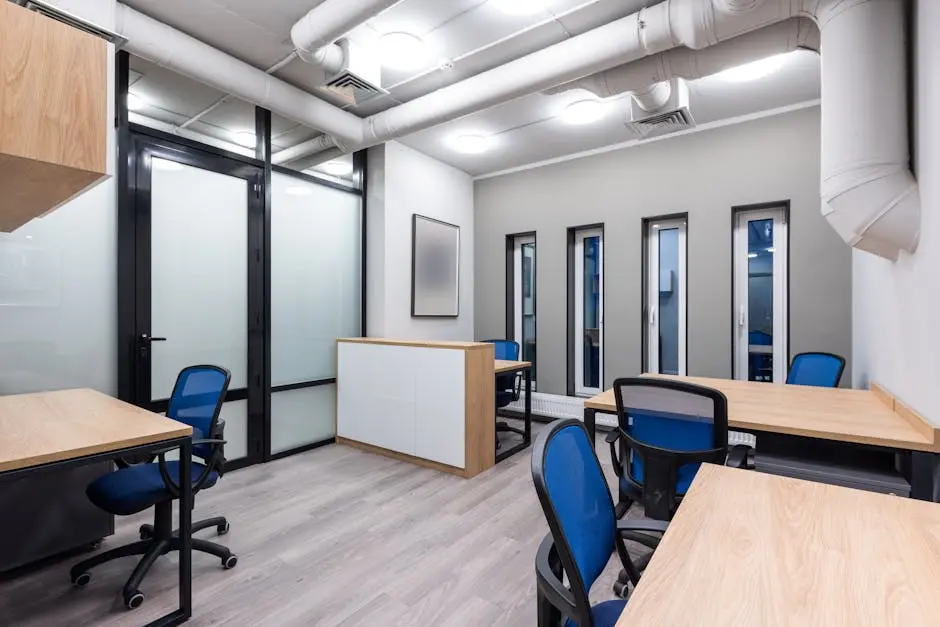In today’s fast-paced business world, creating a comfortable workplace is more important than ever. A well-designed HVAC system can make a significant difference in employee productivity and satisfaction. This blog explores how modern commercial HVAC technology can transform the work environment for the better.
The Importance of Workplace Comfort
A pleasant work environment can directly impact employee productivity and morale. Comfortable temperatures and clean air quality can reduce stress levels and create a more conducive atmosphere for work. According to a study, poor air quality alone can decrease productivity by as much as 10%. Thus, keeping allergens and pollutants at bay is crucial for maintaining a healthy and vibrant workplace.
The pursuit of an ideal work environment often highlights the role of HVAC systems, which are sometimes overlooked in favor of ergonomic desks and chairs. However, the reality is that thermal comfort significantly impacts focus and efficiency. Whether it’s a sweltering summer day or a bone-chilling winter morning, a well-functioning HVAC system ensures employees stay comfortable, boosting overall productivity.
Indoor noise can also be a major distractor. A good HVAC system should quietly maintain the desired ambiance without producing loud or distracting noises. Advanced HVAC systems, designed with sound-dampening features, help alleviate these issues, making the workplace not just comfortable but also conducive to concentration and focus.
Understanding Commercial HVAC Systems
Commercial HVAC systems are designed to heat, ventilate, and air condition large spaces efficiently. These systems are integral to maintaining an optimal indoor climate, especially in areas with volatile weather conditions. By managing temperature, air quality, humidity, and ventilation, they play a critical role in ensuring a safe and comfortable environment for both employees and clients.
A typical commercial HVAC system comprises various components that work together to regulate the indoor climate effectively. These include air conditioners, heat pumps, furnaces, and ventilation systems. Each system can be customized to address the specific needs of a space, whether it’s a bustling office or a serene retail shop. Tailoring these solutions to specific business requirements ensures not only maximum efficiency but also cost-effectiveness.
To further enhance the reliability of these systems, regular maintenance is crucial. Routine checkups ensure that all components are operating at peak performance, mitigating the risk of unexpected breakdowns that can disrupt business activities. Engaging with professionals can help maintain optimal functioning, keeping energy costs manageable and extending the equipment’s lifespan.
Advancements in HVAC Technology
Recent technological advancements in HVAC systems have resulted in more efficient, reliable, and user-friendly options. Innovations like smart thermostats, energy recovery ventilation, and variable refrigerant flow systems are leading the charge in modern HVAC solutions. These systems have brought about a paradigm shift in the climate control landscape, drastically enhancing the way we condition our indoor spaces.
One of the most exciting developments is the integration of Internet of Things (IoT) technology in HVAC systems. This enables remote monitoring and control of HVAC operations, giving users unprecedented control over their indoor climates. IoT-enabled systems can adjust settings in real-time, based on occupancy levels and weather forecasts, ensuring efficient energy use and consistent comfort.
Energy Efficiency and Cost Savings
Implementing modern HVAC technology can significantly reduce energy consumption and operational costs. Newer systems are designed with energy efficiency in mind, helping businesses save on monthly energy bills while minimizing environmental impact. Smart systems optimize heating and cooling cycles, ensuring no energy is wasted during off-peak hours.
Businesses can save considerably through government incentives that encourage the adoption of energy-efficient systems. These incentives, along with reduced utility bills, provide a compelling case for upgrading to modern commercial HVAC systems. Over time, the initial investment in newer technology often pays for itself, delivering an ever-increasing return on investment.
Aside from lowering operational costs, energy-efficient HVAC systems also contribute towards achieving broader sustainability goals. By reducing the overall carbon footprint, companies can position themselves as responsible corporate citizens, enhancing their brand reputation and appealing to environmentally-conscious consumers and potential employees.
Tailoring HVAC Solutions to Specific Needs
Each commercial space is unique, and HVAC solutions can be customized to meet specific requirements. Whether it’s an open-plan office or a manufacturing facility, there are tailored solutions available to ensure optimal performance and comfort. Customized solutions not only address the unique challenges posed by different spaces but also maximize efficiency and minimize costs.
By partnering with experienced professionals, businesses can navigate the complexities of smart HVAC systems and develop tailored solutions that meet their specific operational needs. This customization helps in achieving a balance between the desired comfort levels and energy efficiency, resulting in a more sustainable business model.
Furthermore, solving unique HVAC challenges can often lead to innovative approaches that enhance the overall workplace environment. By closely working with HVAC experts, businesses can explore new system configurations, materials, and technologies that contribute to improved indoor air quality and energy savings.
The Future of Workplace Comfort
Modern commercial HVAC technology is revolutionizing the way businesses approach workplace comfort. By investing in the latest systems, companies not only enhance the well-being of their employees but also increase energy efficiency and operational performance. Ensuring a comfortable, controlled environment is a smart step towards a thriving and productive workplace.




